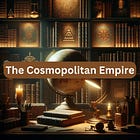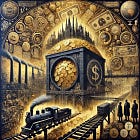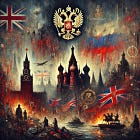The Neo-British Empire
By Lloyd Miller – Understanding the Crown's Methods of Control: A 500 Year Story - 45 Q&As
As long-time readers know, I’m deeply interested in Empire—our Empire—its history, how we arrived here, and how it operates.
Recently, I’ve encountered the work of Lloyd Miller in this domain, and there’s an incredible depth of insight to explore. His research sheds further light on the British Israel doctrine, a concept I first touched upon during my review of Gerry Rose’s lecture in The Venetians.
Question 9: What is the British Israel doctrine and its significance?
British Israel doctrine is a belief system that claims the British (and often by extension, Americans) are descendants of the lost tribes of Israel. It was influential in shaping ideas of racial and cultural superiority in the English-speaking world. The doctrine played a role in justifying imperialism and racial hierarchies, as it suggested that certain peoples were "elect" or chosen by God for leadership roles in the world.
Remarkably, this 500-year history begins with what is essentially a divorce story.
With thanks to Lloyd Miller.
Neo-British Empire of the Crown -- 500 Year Chronology
Related Posts on Empire
Deep Dive Conversations (Bonus for Paid Subscribers)
This deep dive is based on the four related posts mentioned above and this new post.
Discussion No.7 (26-minutes): Top 20 things to understand about our Empire and its history
Thank you for your support.
Analogy
Imagine a sophisticated puppet theater, but instead of a single puppeteer controlling each puppet directly with strings, there's a master puppeteer who has created an elaborate system of automated pulleys and counterweights. The puppets appear to move independently, and most audience members don't even realize they're watching a puppet show at all.
The master puppeteer (The Crown) rarely needs to intervene directly. Instead, they've created a self-sustaining system where:
The pulleys represent the financial system (Bank of England, City of London)
The counterweights represent the balance of power between nations and blocs
The stage lighting (controlling what audiences focus on) represents cultural manipulation and propaganda
The theater staff (working behind the scenes) represents secret societies and intelligence networks
The theater's ticketing system (controlling who gets in and where they sit) represents prestige associations and elite management
When the master puppeteer does need to make adjustments, they don't pull strings directly but rather subtly adjusts the weights, pulleys, or lighting. Most importantly, the puppeteer has designed the system so that any puppet that tries to break free will be automatically constrained by the other puppets' movements through the interconnected pulley system.
This creates an illusion of freedom and independence while maintaining effective control through systematic rather than direct manipulation. The genius of the system is that most people watching the show never realize they're watching a carefully orchestrated performance - they believe they're seeing spontaneous, independent actions.
12-point summary
1. Power Structure Foundation: The British Empire operates as a sophisticated network of interlocking "power organisms" rather than a traditional empire, using financial control, secret societies, and cultural manipulation to maintain global influence.
2. Historical Evolution: Beginning with Henry VIII's break from Rome, continuing through Elizabeth I's establishment of naval power, and culminating in the 1694 creation of the Bank of England, Britain systematically built its power base through religious independence, maritime dominance, and financial control.
3. Financial Control Mechanism: The Bank of England and City of London serve as the operational center of global financial manipulation, using debt, currency control, and trade policies to maintain power without direct political control.
4. Intelligence Network: Secret societies, particularly Masonry, function as sophisticated intelligence gathering and covert action networks, operating under the cover of mystical or philosophical organizations.
5. Strategic Alliance System: A long-standing alliance between British and Jewish interests against Vatican power provided crucial financial and intelligence capabilities, forming a cornerstone of British imperial strategy.
6. Balance of Power Doctrine: Britain maintains control by setting near-equal forces against each other, maintaining tension rather than allowing resolution, and positioning itself as the decisive factor in conflicts.
7. Three-Bloc World Order: Post-WWII organization divided global power between Soviet, Anglo-American, and Chinese blocs, creating a framework for managed conflict while preventing direct confrontation through nuclear deterrence.
8. Cultural Manipulation: Controlled opposition movements, including counter-culture, environmental activism, and social movements, serve as safety valves for social tension while advancing British strategic interests.
9. Religious-Occult Dimension: Mysticism and occult practices serve multiple functions, providing intelligence cover, challenging Vatican authority, and offering alternative spiritual frameworks that support British power.
10. Modern Control Methods: Contemporary control operates through sophisticated financial mechanisms, cultural influence, and managed conflict rather than direct colonial administration.
11. Institutional Framework: Prestige associations like the Council on Foreign Relations and Bilderbergers shape acceptable ranges of public opinion among elites, maintaining control through intellectual and policy influence.
12. Strategic Flexibility: The "Perfidious Albion" approach involves shifting alliances based on balance of power requirements, maintaining no permanent allies but rather permanent interests.
45 Questions & Answers
Question 1: What significant changes occurred during Henry VIII's reign that established the foundation for British independence from Rome?
Answer: The foundation was established through a series of calculated moves beginning with Henry's search for Biblical justification for divorce, sending his agent Richard Croke to Venice to consult Jewish Rabbis and Christian Cabalist theologians. This marked the beginning of a strategic alliance between England's Crown and Jews fleeing the Vatican's Inquisition. The definitive break came with the 1535 Act of Supremacy, declaring Henry the Supreme Head of the Church of England, followed by the seizure of Church lands, effectively ending Rome's control over English religious and financial matters.
The transformation was completed through institutional changes, including the Protestant Reformation and establishment of the Church of England, representing not just religious reform but a fundamental power shift. This period marked the beginning of England's emergence as an independent power base, establishing a pattern of opposition to Vatican authority that would characterize British geopolitical strategy for centuries to come.
Question 2: How did Elizabeth I's reign contribute to the establishment of British naval and commercial power?
Answer: Elizabeth I's reign marked a decisive turn toward maritime dominance through strategic actions against Spain, including supporting Netherlands Protestants and Jews against Spanish control, while allowing Drake to plunder Spanish galleons. The defeat of the Spanish Armada in 1588 established British naval superiority and marked the beginning of Britain's maritime dominance. This period also saw the chartering of the East India Company in 1600, launching Britain's commercial empire.
Elizabeth's reign also established the foundational alliance between British power and Jewish commercial interests, while developing the intelligence apparatus through figures like John Dee. The combination of naval power, commercial expansion, and strategic alliances created during this period established the template for British global dominance that would persist for centuries.
Question 3: What role did John Dee play in developing the British Israel doctrine?
Answer: Dee functioned as Elizabeth I's primary architect of imperial ideology, introducing English society to Renaissance "Christian" cabalism, magic, and science with Jewish/Sufi roots from Venice between 1558-1583. As Elizabeth's scientist, magician, astrologer, and intelligence agent, he invented the "British Israel/Identity" doctrine specifically to justify British Empire expansion, marking the first public indication of alliance with Jewish enemies of the Vatican "Anti-Christ."
Beyond theoretical work, Dee conducted intelligence operations under occult cover, notably planting Rosicrucianism in Germany during his European travels. His work created the ideological foundation that would justify British expansion while simultaneously establishing networks of influence through mystical societies, demonstrating the early fusion of occult spirituality with imperial ambition that would characterize British power projection.
Question 4: How did the relationship between British Puritans and Jews influence early British Empire development?
Answer: The Puritans initially gained attention not for religious intolerance but for their "cabalistic" Bible interpretation that defied Rome's authority. They actively sought out Jews for Old Testament interpretation, leading to accusations of "Judaising." This theological alliance created a practical foundation for later political and commercial cooperation, as demonstrated when Manasseh Ben Israel petitioned Cromwell for Jewish return to England based on cabalistic Bible interpretation.
Cromwell's Puritan advisors supported Jewish settlement in England, believing Jews would convert to their pure, Biblical Christianity. This religious-commercial alliance proved crucial during Cromwell's war with Spain, as Jewish merchants provided vital support against Catholic Spain, which they viewed as the incarnation of the Papal anti-Christ. This relationship established a pattern of mutual support against Catholic power that would characterize British Empire development.
Question 5: What was the significance of the 1694 establishment of the Bank of England?
Answer: The Bank of England's establishment represented a revolutionary fusion of Royal, Jewish, and Noble ownership interests, creating what would become the primary engine of government power and global financial dominance. This institution inaugurated the concept of National Debt, providing the structural foundation for financial domination of the world through debt-based monetary control.
The timing of the Bank's creation, following the "Glorious Revolution" and William of Orange's arrival from the Netherlands, cemented the British-Dutch-Jewish alliance that would dominate global finance. This marked the institutionalization of financial power as the primary mechanism of imperial control, establishing a model of monetary manipulation that would characterize British global influence for centuries to come.
Question 6: How does the concept of "power organisms" explain historical developments?
Answer: Power organisms represent institutional structures that, once programmed by their founders, develop a "life of their own" and operate semi-autonomously. This concept bridges the gap between conspiracy and historical development, explaining how coordinated action can persist across generations without requiring constant direct control, operating through established institutional patterns and responses.
These organisms exist at multiple levels - sub-organisms, organisms, and supra-organisms - creating a complex hierarchy of interacting power structures. The British Empire itself represents a world supra-organism, incorporating numerous subordinate organisms that are manipulated across political, spiritual/psychological, military, economic, and scientific dimensions, allowing for coordinated action without constant direct management.
Question 7: What is the structure and function of the "Crown" or "High Cabal"?
Answer: The Crown consists of the British Royal Family and its allied European Royal/Noble Dynasties, including houses like Hesse, von Thurn und Taxis, Orange, Mountbatten, and Cecil, functioning as the apex of the global parasitical world supra-organism. Their power rests on a combination of personal prestige and vast secret financial resources, likely hidden in Swiss banks and other havens, forming a "Royal Depositors League" that provides leverage over world merchant bankers.
The Crown's primary function involves maintaining balance between component organisms of the Neo-British Empire, including nations, religions, cults, and corporations. While they must constantly manage crisis situations, evidence suggests they scientifically use crisis management to move the world in predetermined directions, though the extent of their control versus reactive management remains debatable.
Question 8: How do international bankers serve as agents of Crown control?
Answer: International bankers, particularly the "World Money Cartel" or "Empire of the City (of London)," operate as the Crown's primary financial muscle through the Bank of England. This network includes legendary banking families like the Warburgs, Rothschilds, Barings, Brown-Shipley, Schroeders, Morgan-Grenfels, and Lazard Freres, maintaining strategic outposts in key global financial centers including New York, Paris, Hamburg, Hong Kong, and Switzerland.
These banking networks provide the financial leverage required to achieve "balance of power" in all important arenas, serving as the practical mechanism through which Crown control is exercised. The relationship between the Crown and these bankers may not always be explicitly coordinated, as the Crown can use its vast secret resources to manipulate the bankers themselves when necessary.
Question 9: What is the relationship between the City of London and global financial control?
Answer: The City of London functions as the operational center of the "World Money Cartel," coordinating global financial manipulation through its network of merchant bankers and financial institutions. This financial nexus represents the most directly controlled organ of Crown power, providing the practical mechanisms through which global financial dominance is maintained and exercised.
The City's power extends through its global network of banking outposts, creating a web of financial control that enables the manipulation of national economies and international trade. This structure, established with the Bank of England's founding, represents the institutionalization of financial power as the primary mechanism of imperial control, operating through debt, currency manipulation, and control of international trade.
Question 10: How does the dialectical method serve as a control mechanism?
Answer: The dialectical method operates by setting near-equal forces in opposition to each other, creating controlled conflict between thesis and antithesis, with the Crown retaining the "balance of power" necessary for policy-making or synthesis. This approach allows for control through the manipulation of seemingly natural conflicts, rather than direct command, making it more subtle and effective than traditional forms of domination.
The Crown's power often relies on prolonging the thesis versus antithesis stage, maintaining stalemate conditions that prevent the natural resolution of conflicts. This approach allows for continuous manipulation under the guise of maintaining "fairness," while destructive "destabilization" of ascendant organisms through both left and right subversion typically proves less expensive than supporting weakening organisms.
Question 11: What is the relationship between Masonry and British imperial power?
Answer: Masonry serves as a covert intelligence agency with an occult "cover," established firmly in 1717 after being purged of Stuart-Catholic influences. The organization forms part of a coherent worldwide propaganda, intelligence, promotion control, and covert action capability at the command of the Neo-British Empire.
Masonic networks facilitate everything from violent "destabilizations" of uncontrollable governments to subtle promotion of useful ideas and movements such as communism, ecology, drug revolution, New Age Movement, and Bible Prophecy. This dual function of intelligence gathering and social manipulation makes it a crucial tool of imperial control.
Question 12: How do secret societies function as intelligence gathering mechanisms?
Answer: Secret societies operate as a sophisticated network for gathering intelligence while maintaining plausible deniability through their occult and mystical facades. The occult elements provide excellent "cover" for intelligence gathering and covert activities, allowing operatives to move freely under the guise of spiritual or philosophical pursuits.
These organizations create a parallel structure of power and influence that operates alongside official channels, providing the Crown with information and operational capabilities outside normal diplomatic and political constraints. This system allows for the manipulation of events while maintaining apparent separation from official British policy.
Question 13: What is the significance of the British-Jewish alliance against the Vatican?
Answer: The British-Jewish alliance emerged from shared opposition to Vatican power, beginning with Henry VIII's consultation of Jewish rabbis for Biblical interpretation and strengthening through Elizabeth I's reign. This alliance combined British military and political power with Jewish commercial and financial expertise, creating a formidable opposition to Catholic dominance.
The partnership provided Britain with crucial financial and intelligence networks while offering Jews protection and opportunities denied them in Catholic countries. This mutual interest in limiting Vatican power created a durable alliance that would shape global power structures through subsequent centuries.
Question 14: How does mysticism and the occult serve British imperial interests?
Answer: Mysticism and the occult provide multiple strategic advantages, including psychological knowledge useful for self-mastery and propaganda techniques derived from Cabalistic and Sufic traditions. These esoteric practices offer excellent cover for intelligence operations while simultaneously providing alternative spiritual frameworks that challenge Vatican authority.
The proliferation of cults and spiritual movements serves as a safety valve, harmlessly releasing desires for freedom in increasingly regulated societies. This spiritual diversity undermines Vatican attempts at dogmatic control, supporting Britain's strategy of appearing more liberal and tolerant than its rivals.
Question 15: What role do prestige associations play in maintaining power?
Answer: Organizations like the Council on Foreign Relations, Bilderbergers, and Royal Institute of International Affairs function to shape acceptable ranges of public opinion among society's "higher circles." These groups propagate carefully chosen issues and false dichotomies that fuel the dialectical process and conflict management scenarios.
These associations serve as primary venues for direct secret society and financial agents of the Crown to influence leading figures across various fields. By controlling the parameters of debate and decision-making among elites, these organizations effectively manage the direction of social and political development.
Question 16: How does the "balance of power" principle operate in British strategy?
Answer: The balance of power strategy involves maintaining controlled tension between opposing forces, allowing Britain to act as the decisive factor in any conflict. This approach requires constant adjustment of support between different powers to prevent any single entity from becoming dominant.
Britain achieves this balance through financial manipulation, intelligence operations, and diplomatic maneuvering, ensuring that no continental power becomes strong enough to challenge British interests. This strategy allows for maximum influence with minimum direct involvement.
Question 17: What is the significance of the three-bloc world system?
Answer: The three-bloc system, established after World War II, divided global power between the Soviet Bloc, Anglo-American Bloc, and Red Chinese Bloc. This structure was designed to replace the expensive and unstable colonial period, creating a framework for "safe," controlled conflict between essentially invincible superpowers.
The system required deliberate efforts to maintain rough equality between blocs, explaining seemingly paradoxical policies of building up Eastern powers while simultaneously weakening the Free World. Nuclear weapons helped maintain this balance by making direct confrontation too costly.
Question 18: How does Britain maintain control over seemingly independent nations?
Answer: Control is maintained through a combination of financial leverage, intelligence networks, and cultural influence rather than direct political control. The Bank of England and associated financial institutions exercise power through debt mechanisms and monetary policy, while secret societies and prestige associations influence national elites.
This system allows for the appearance of independence while maintaining effective control through economic and cultural mechanisms. The approach proves more cost-effective and sustainable than direct colonial administration.
Question 19: What role does cultural manipulation play in maintaining power?
Answer: Cultural manipulation operates through controlled opposition movements, including drug/rock counter-culture, anti-war movements, and environmental activism. These movements serve as safety valves for social tension while simultaneously advancing British strategic interests by weakening potential rival powers.
The creation and management of cultural movements allows for the direction of social change without apparent external control. This approach proves particularly effective in undermining rival powers' social cohesion and national unity.
Question 20: How does financial control support political dominance?
Answer: Financial control operates through the integrated network of international banking institutions centered on the Bank of England and City of London. This system allows for the manipulation of national economies through debt, currency exchange rates, and trade policies.
The ability to create or withdraw credit gives the financial system tremendous leverage over political decisions, while maintaining apparent independence from direct political control. This separation provides deniability while ensuring effective power over national policies.
Question 21: How did Britain achieve global naval supremacy?
Answer: Naval supremacy began with the defeat of the Spanish Armada in 1588, marking Britain's emergence as a dominant maritime power. Elizabeth I's strategic support of privateers like Drake against Spanish shipping, combined with the chartering of the East India Company, established the foundation for controlling global sea lanes and commerce.
This naval dominance expanded through systematic development of maritime capabilities and strategic control of key ports and shipping lanes. The combination of commercial and military naval power allowed Britain to enforce its will globally, particularly evident in actions like the Opium Wars with China and the establishment of strategic bases worldwide.
Question 22: What was the true nature of the American Revolution according to this analysis?
Answer: Britain allegedly put up token resistance while actually fighting a larger world war against multiple powers including Russia, France, Holland, French Canadians, Spain, Sweden, Denmark, and Prussia in the League of Armed Neutrality. The American separation was managed to create a "myth" useful for the new nation while maintaining effective control through financial mechanisms.
The installation of a constitutional government with built-in checks and balances was designed to make America permanently subservient to the Money Power of the Bank of England and its agents like Peabody, Morgan, Brown, and Belmont. This transformed America into a "covert" colony of Britain, maintaining economic control while granting political independence.
Question 23: How did Britain manage the French Revolution to its advantage?
Answer: Illuminist/Masonic forces, with Prussian support and complicit Orleanists, were used to bring down the French Monarchy for Britain's benefit. The subsequent chaos was carefully managed to weaken France while preventing any single faction from gaining too much power.
The revolution effectively eliminated France as a major rival while creating conditions that would eventually allow Britain to emerge as the dominant European power. The process culminated in the Napoleonic Wars, which further consolidated British power while exhausting continental rivals.
Question 24: What role did the Rothschilds play in expanding British power?
Answer: The Rothschilds and other "continental" Jewish bankers were rewarded with positions in "the City" for their financial services to the Crown, particularly after helping the Elector of Hesse hide enormous wealth from Napoleon. Their integration into the British financial system expanded its reach across Europe.
Their network of family banks across European capitals provided Britain with financial intelligence and control mechanisms throughout the continent. This financial web became a crucial tool for implementing British policy and maintaining control over European affairs through monetary manipulation.
Question 25: How did Britain emerge victorious from the Napoleonic Wars?
Answer: Britain's final victory over Napoleon in 1815 was achieved through Bank of England financing and strategic alliances, creating the "Concert of Europe" with Britain as the covert "Conductor." This victory established a new era of British dominance in European affairs.
The peace settlement was carefully managed to prevent any continental power from achieving dominance while establishing Britain as the primary arbiter of European politics. This arrangement institutionalized British influence over European affairs through financial and diplomatic mechanisms.
Question 26: How did Britain manage the "Concert of Europe"?
Answer: Britain maintained control through a sophisticated balance of power strategy, refusing to join the Holy Alliance while simultaneously using "world revolution" as a weapon against competing international power organisms, particularly the Vatican's Catholic Church and the Czar's Orthodox Church.
By positioning itself as the champion of liberty against authoritarianism, Britain successfully manipulated European politics while maintaining its position as the dominant power. This strategy allowed Britain to appear as a moderating influence while actually directing events to its advantage.
Question 27: What was the significance of the Opium Wars?
Answer: The Opium Wars represented Britain's enforcement of its right to push opium from India into China, demonstrating the integration of commercial interests with military power. This conflict established Britain's ability to force trade concessions from even large, independent powers.
The wars exemplified Britain's use of military force to support commercial interests, while simultaneously weakening potential rival powers through social degradation. This combination of profit and strategic weakening of rivals typified British imperial strategy.
Question 28: How did Britain establish control over India?
Answer: Control over India was achieved through a combination of commercial penetration via the East India Company and military force when necessary. The 1858 Indian Mutiny's suppression led to direct Crown control, with Victoria being made Sovereign of India.
This control provided Britain with vast resources and strategic depth, while the administration of India served as a training ground for imperial management techniques. The Indian experience provided templates for controlling large populations through limited administrative resources.
Question 29: What was the role of Cecil Rhodes in expanding British power?
Answer: Rhodes functioned as both a South African gold and diamond magnate and the architect of renewed idealistic support for British Imperialism through the formation of the "Round Table" conspiracy. His efforts combined commercial exploitation with ideological justification for empire.
His work in South Africa, including the failed Jameson Raid and eventual success in the Boer War, secured crucial mineral resources while establishing patterns for managing white settler colonies. The Round Table organization became a key mechanism for coordinating imperial policy.
Question 30: How did Britain manipulate European conflicts?
Answer: Britain consistently maintained a policy of supporting weaker powers against stronger ones to prevent any continental nation from achieving dominance. This strategy involved shifting alliances as circumstances required, earning Britain the nickname "Perfidious Albion."
This manipulation extended to supporting the rise of certain powers when useful for balancing others, then working to check those same powers when they became too strong. This flexible approach allowed Britain to maintain its position as the decisive factor in European politics.
Question 31: How did Britain manipulate World War I to its advantage?
Answer: Britain guided the preparation for war through Col. House and the Fabian/Round Table connections that influenced the Wilson Administration. Key mechanisms included the establishment of the Federal Reserve and Income Tax in 1913, which provided the financial infrastructure necessary for American involvement.
The war itself was managed to eliminate German/Austrian/Turkish domination of Europe while simultaneously gaining Jewish support through the Balfour Declaration, which laid groundwork for future Middle East "balance of power" strategies. This dual approach of military victory and strategic positioning characterized British wartime policy.
Question 32: What was the significance of the Balfour Declaration?
Answer: The 1917 Balfour Declaration secured Jewish support for British war efforts while simultaneously creating a mechanism for future Middle East control. This strategic document laid the groundwork for ongoing regional tension that Britain could manipulate.
The Declaration demonstrates the sophisticated nature of British policy, using promises of a Jewish homeland to gain immediate support while creating conditions for long-term regional control through managed conflict. This approach typified British strategic thinking about combining immediate advantages with future control mechanisms.
Question 33: How did Britain manage the interwar period?
Answer: Britain attempted to return to the gold standard at pre-war rates in 1924, pressing the Federal Reserve to support the pound by inflating the dollar. This led to the 1920s stock market boom and subsequent 1929 crash, followed by worldwide depression.
During this period, Britain manipulated the rise of fascist movements while simultaneously maintaining the ability to oppose them later. The economic chaos of the period was used to reshape global financial relationships to Britain's advantage, despite apparent British economic difficulties.
Question 34: What role did Britain play in the rise of fascism?
Answer: Britain attempted to seize control of continental fascist movements while the Vatican saw the world depression as an opportunity to smash British monopoly capitalism. The British successfully gained influence over Hitler despite his origins in Catholic-aligned movements.
The "Round Tablers" and "Cliveden Set" orchestrated initial appeasement of Hitler, encouraging his eastward expansion. This policy ultimately proved more successful than expected, requiring adjustment when Hitler invaded westward instead of maintaining focus on the east.
Question 35: How did Britain emerge from World War II with its power intact?
Answer: Britain managed to transform its empire into a new form through the establishment of the United Nations and the creation of a three-bloc world system. The apparent decline of direct British power masked the emergence of more sophisticated control mechanisms.
The transition from direct colonial control to financial and cultural domination allowed Britain to maintain effective power while reducing administrative costs and responsibilities. This transformation represented a more sustainable model of global influence.
Question 36: How was the three-bloc world system established after WWII?
Answer: After briefly considering a pre-emptive nuclear attack on Russia, Britain opted for establishing a three-bloc system balancing the Soviet, Anglo-American, and Chinese spheres. This required deliberately weakening American power while building up communist blocs to achieve relative parity.
The system was stabilized through nuclear deterrence, which made direct confrontation too costly and allowed for controlled conflict in peripheral areas. This arrangement provided a framework for managing global competition without risking total war.
Question 37: What role does nuclear deterrence play in maintaining power?
Answer: Nuclear weapons serve as the "great equalizer" in maintaining balance between power blocs, making direct confrontation between major powers too costly to contemplate. This creates a framework of Mutually Assured Destruction (MAD) that stabilizes the three-bloc system.
The nuclear balance allows for controlled conflicts in peripheral areas while preventing any bloc from achieving decisive superiority. This arrangement supports British strategy by maintaining tension without allowing resolution through direct conflict.
Question 38: How does Britain maintain control in the post-colonial era?
Answer: Control shifted from direct colonial administration to manipulation through financial mechanisms, cultural influence, and intelligence networks. The appearance of independence masks continued effective control through economic and cultural levers.
This system operates through international banking, secret societies, and prestige associations, allowing for sophisticated manipulation of seemingly independent nations. The approach proves more cost-effective and sustainable than traditional colonialism.
Question 39: What is the significance of the ecology and counter-culture movements?
Answer: These movements were allegedly designed as safety valves for social tension while simultaneously advancing British strategic interests by weakening potential rival powers. The ecology movement specifically serves to apply brakes to American technology and progress.
These cultural manipulations help establish murderous no-growth Malthusian stability while appearing to arise spontaneously from social conditions. They represent sophisticated tools for managing population behavior and economic development.
Question 40: How does Britain maintain modern financial control?
Answer: Modern control operates through the integrated network of international banking institutions centered on the City of London. This system allows manipulation of national economies through debt, currency exchange rates, and trade policies while maintaining apparent independence from political control.
The ability to create or withdraw credit gives tremendous leverage over political decisions worldwide. This financial control system represents the evolution of imperial power into more sophisticated and less visible forms.
Question 41: How does the concept of "Perfidious Albion" explain British strategy?
Answer: The concept of "Perfidious Albion" reflects Britain's strategic flexibility in shifting alliances based on balance of power requirements. From its insular island position, Britain maintains influence by consistently supporting weaker powers against stronger ones, never maintaining permanent allies but rather permanent interests.
This approach allows Britain to appear as the defender of liberty while simultaneously manipulating conflicts for its own benefit. The strategy involves prolonging conflicts between opposing forces rather than seeking their resolution, maintaining British influence through managed tension.
Question 42: What is the relationship between geopolitics and occult manipulation?
Answer: Contrary to researchers who posit mystical adepts as ultimate conspirators, geopolitical manipulation remains primary while occult elements serve as tools for intelligence gathering and social control. Secret societies and subversion function as the "underbelly" or "covert adjunct" of geopolitical manipulation.
The occult provides cover for intelligence operations while simultaneously offering alternative spiritual frameworks that challenge Vatican authority. This combination of practical utility and ideological influence makes occult manipulation a sophisticated tool of geopolitical control.
Question 43: How does the British Empire differ from traditional empires?
Answer: The British Empire operates as a parasitical world supra-organism rather than a directly administered territorial empire. It functions through financial control, intelligence networks, and cultural manipulation rather than explicit political domination.
Unlike the Vatican, which strives for explicit control through a fully integrated world organism, the British "Crown" seeks parasitical supra-organism status, maintaining control through balance of power and manipulation rather than direct administration.
Question 44: What role does propaganda play in maintaining power?
Answer: Propaganda operates through multiple levels, from occult societies and prestige associations to managed cultural movements and controlled opposition. The system creates and maintains false dichotomies that fuel dialectical processes while directing social change in desired directions.
Modern propaganda includes environmental movements, counter-culture, and managed opposition movements that serve as safety valves for social tension while advancing British strategic interests. This sophisticated approach allows for the direction of social change without apparent external control.
Question 45: How does the Neo-British Empire maintain control in the modern world?
Answer: The Neo-British Empire maintains control through an integrated system of financial manipulation, intelligence networks, cultural influence, and managed conflict. This system operates through apparently independent institutions while maintaining coordinated direction through the City of London and associated networks.
The modern system represents the evolution of imperial control into more sophisticated forms, replacing direct administration with financial leverage, cultural manipulation, and managed tension between power blocs. This approach proves more sustainable and cost-effective than traditional imperial control mechanisms.
I appreciate you being here.
If you've found the content interesting, useful and maybe even helpful, please consider supporting it through a small paid subscription. While everything here is free, your paid subscription is important as it helps in covering some of the operational costs and supports the continuation of this independent research and journalism work. It also helps keep it free for those that cannot afford to pay.
Please make full use of the Free Libraries.
Unbekoming Interview Library: Great interviews across a spectrum of important topics.
Unbekoming Book Summary Library: Concise summaries of important books.
Stories
I'm always in search of good stories, people with valuable expertise and helpful books. Please don't hesitate to get in touch at unbekoming@outlook.com
For COVID vaccine injury
Consider the FLCCC Post-Vaccine Treatment as a resource.
Baseline Human Health
Watch and share this profound 21-minute video to understand and appreciate what health looks like without vaccination.

















Not a lot of people mention John Dee — glad to see you call him out. Here’s an excerpt from my book that I wrote on him: https://unorthodoxy.substack.com/p/the-man-behind-the-british-empire
KYL - Know Your Latin
imperium in imperio
def: a state within a state, inclusive of deep states or other forces which operate with sovereign-like impunity within a polity.
The Anglo-Zionist cabal would seem to qualify highly. 😀